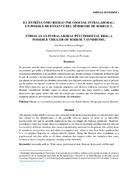El estrés como riesgo psicosocial intralaboral: un posible detonante del síndrome de Boreout

Fecha
2021Autor(es)
Sinisterra Klinger, Judy MarcelaDirector(es)
Salcedo Ariza, María CeciliaMetadatos
Mostrar el registro completo del ítemResumen
El presente artículo tiene como propósito realizar una investigación teórico descriptivo de tipo documental que aluda a la identificación de los posibles aspectos relevantes del estrés como riesgo psicosocial intralaboral y sus posibles implicaciones que pueden detonar el síndrome de Boreout; por lo que de acuerdo a lo encontrado el estrés es considerado como un riesgo psicosocial intralaboral que puede ser provocado por distintas situaciones que originan reacciones agobiantes para la persona que lo padece; en algunas ocasiones de manera positiva y otras de manera negativas es por ello que Hans Selye menciona que es una respuesta adaptativa ante diversos estímulos estresores. Siendo el Boreout considerado también como un riesgo psicosocial que hace alusión a todas aquellas situaciones que pasan dentro del sitio de trabajo que ocasiona que los trabajadores tengan una respuesta negativa, provocando el aburrimiento del trabajador.
Abstract
The purpose of this article is to carry out a descriptive theoretical investigation of a documentary type that alludes to the Identification of the possible relevant aspects of stress as an intra-labor psychosocial risk and its possible implications that can trigger the boreout syndrome; Therefore, according to what was found, stress is considered as an intra-occupational psychosocial risk that can be caused by different situations that cause overwhelming reactions for the person who suffers from it; sometimes in a positive way and others in a negative way, which is why Hans Selye mentions that it is an adaptive response to various stressful stimuli. Being the Boreout also considered as a psychosocial risk that refers to all those situations that happen within the workplace that cause workers to have a negative response, causing worker boredom.
Colecciones
- Psicología [203]
